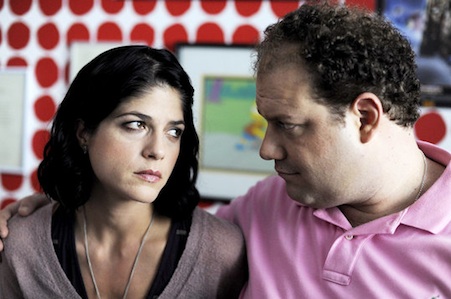“All my films are about love,” Todd Solondz explained, sipping a glass of water as we sat down to talk about Dark Horse last fall. He has persistently made that claim since the very beginning of his directing career, but it has always been easy to dismiss: his plots and topics have been provocative and extravagant, both too hot to handle and emotionally cold.
It’s generally taken some courage on the part of the viewer to make the leap of faith into a Solondz film, but in the case of Dark Horse, it feels like the director has dropped his guard a little bit. For the very first time, that deep understanding of his characters, the desire to understand their frustrations and the dilemmas he’s presented so many times, are displayed for all to see. Dark Horse is a genuine love story, touching on many different types of love: romantic, parental, fraternal, self-love. Of course, it wouldn’t be Solondz if the main protagonist’s life did not resemble a tragic version of George Costanza’s and we didn’t get a bitter ending instead of a happy one. It’s no romantic comedy, but an ironic, uncompromisingly mean-to-everyone tough-loving Solondz classic.
‘Dark Horse’ Scene
This scene, which starts with our protagonist Abe in the driver’s seat and ends when the car pulls off, is a perfect example of what this director’s style is about. Forget fancy settings, playing with subtle lighting/image textures or ultra-long, meaningful takes. We’re talking content: witty, insightful, perfectly pasted dialogue, with every separate scene having a complex, multilayered structure and, of course, dark humor seeping out of the most unexpected places. Dialogue is a substantial part of Solondz’ cinema, with humor and distance functioning as an emergency exit for the emotional tension building up, as in this scene. His casting is spot on; the chemistry between the characters exceptional. Add effective editing and you have all the ingredients of a Solondz classic.
Three people in one car. Two of them possibly a projection of the main character’s troubled mind and the ontological status of the whole scene questionable. But whether it’s really happening doesn’t matter so much. Abe has just been laid from a job that he hated, by his own father no less, whom he hates as well. He’s driving angrily with no precise sense of direction and talking to his mother’s and brother’s phantoms. They are people who love him, but unwittingly take everything away from him: his adulthood, freedom and, finally, his woman. In this limited, closed space, words are being thrown like bricks, tension building up with every new line, the atmosphere becoming unbearably thick. Abe likes to cover for his lack of success with layers of attitude and wants people to think that he’s OK with his balding scalp and too-round belly. But in fact he does not accept himself, therefore what’s gong on in the car is a true bullying session. Phyllis and Richard are mercilessly pounding him with words, voicing all Abe’s presumptions and fears. Is it what they really think or is it his mind that puts those lines in their mouths?
It wouldn’t be a Solondz’ film if there was only seriousness, though. There are many subtle clues defining the character, at the same time adding an absurd, ironic layer to this sequence. Abe’s car, a yellow, matchbox-y Hummer, is an expression of his mental underdevelopment, young-adult taste and passion for collectable toys. His mother’s fancy glasses and colorful clothing stand in direct opposition to her conservative, jovial personality. With a genial face and a gentle tone, she’s telling Abe things no mother should ever tell her child. Such duality is yet another Solondzian tool. Then the finishing touch: a genuine, deep sense of sadness and sobriety underlying the seemingly ironic-only character of this scene. Abe is unlikeable, but in this moment he becomes completely vulnerable. He’s disoriented, lonely and desperate. His father disowned him, his mother and brother are tormenting him and the only thing he has in common with his wife-to-be is utter reluctance to face reality. He has been refusing to grow up ever since he was born, and now, jobless, with an emotionally challenged partner, and the only thing he owns for sure being a collection of action figures, he has to face that reality head-on.




